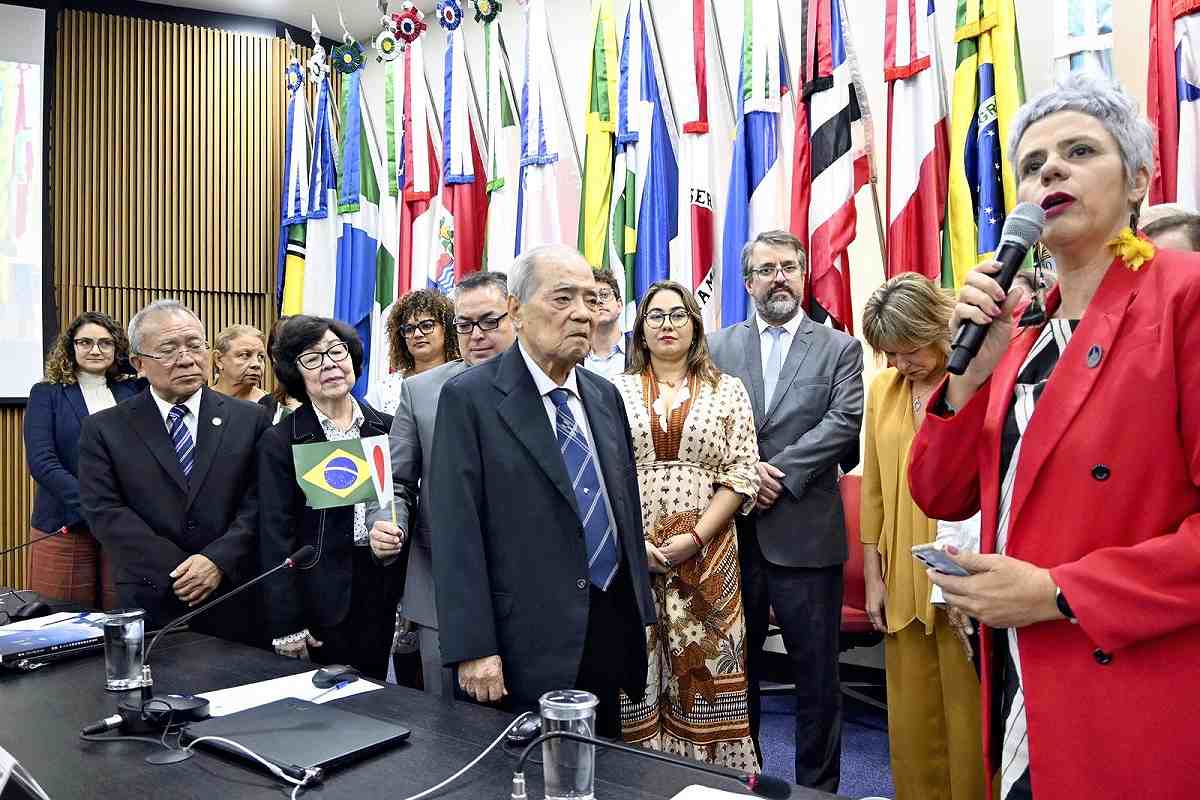Brazil Apologizes for Past Abuse of Japanese Immigrants; Many Relocated, Imprisoned by Dictatorship in WW2 Era

Enea Almeida, chairperson of the Brazilian government’s amnesty commission, right, apologizes to Japanese immigrants in Brasilia on Thursday.
20:00 JST, July 26, 2024
BRASILIA – The Brazilian government on Thursday made its first official apology for the World War II-era persecution of Japanese immigrants and their descendants in Brazil.
The amnesty commission, a government advisory body, acknowledged for the first time that a series of acts committed under the then Brazilian government constituted human rights violations against Japanese immigrants and their descendants.
Brazil is home to the world’s largest community of people with Japanese heritage. Nearly 80 years after the war ended, the honor of the Nikkei community has officially been restored.
The 12-member commission unanimously and fully acknowledged an appeal filed by Japanese immigrants and others following deliberations at the commission’s meeting in Brasilia.
The apology request was filed by third-generation Japanese-Brazilian Mario Okuhara, 49, who produced a documentary about the persecution of people with Japanese heritage, and the Brazil Okinawa Kenjinkai, an association of people of Okinawan descent, to which many Japanese immigrants have belonged.
They demanded an acknowledgment of the persecution and an apology, but not financial compensation.
During the war, about 6,500 Japanese immigrants, suspected of espionage, were ordered to leave Santos, Sao Paulo State, within 24 hours and were forcibly sent to various parts of Brazil. Even after the war ended, 172 people were imprisoned at the Anchieta Island Prison off the coast of the state as fanatical terrorists for believing that Japan had won the war.
The apology request applied mainly to this wartime persecution and postwar imprisonment.
During its deliberation, the commission reported on the case of a young man who committed suicide after being imprisoned and tortured for refusing to step on the Japanese flag during an interrogation by Brazilian authorities.
“On behalf of Brazil as a nation, I apologize for the persecution, atrocities and racism suffered by your ancestors,” said Enea Almeida, chairperson of the commission. She then added in Japanese, “The Brazilian government asks for forgiveness for the persecution of your ancestors.”
About 100 Japanese-Brazilians who filed the request attended the deliberation. They rejoiced with one another, waving the Japanese and Brazilian flags.
“This is a groundbreaking, commendable decision that will rewrite the history of people with Japanese heritage,” said Akira Miyagi, an 86-year-old first-generation Japanese-Brazilian and a member of the Okinawa association.
“We cannot erase the atrocities committed against our parents and grandparents, but we can learn from these sad episodes and strive to make sure that they will never happen again,” said Okuhara.
Regarding postwar compensation for wartime incidents, the governments of the United States and Canada, where Japanese immigrants and their descendants were interned, apologized and paid reparations in 1988.
The Peruvian government also apologized in 2011 for the forced relocation of people of Japanese descent in the country.
Top Articles in World
-

Israeli Ambassador to Japan Speaks about Japan’s Role in the Reconstruction of Gaza
-

Videos Plagiarized, Reposted with False Subtitles Claiming ‘Ryukyu Belongs to China’; Anti-China False Information Also Posted in Japan
-

North Korea Possibly Launches Ballistic Missile
-

Chinese Embassy in Japan Reiterates Call for Chinese People to Refrain from Traveling to Japan; Call Comes in Wake of ¥400 Mil. Robbery
-

Russia: Visa Required for Visiting Graves in Northern Territories, Lifting of Sanctions Also Necessary
JN ACCESS RANKING
-

Japan PM Takaichi’s Cabinet Resigns en Masse
-

Japan Institute to Use Domestic Commercial Optical Lattice Clock to Set Japan Standard Time
-

Israeli Ambassador to Japan Speaks about Japan’s Role in the Reconstruction of Gaza
-

Man Infected with Measles Reportedly Dined at Restaurant in Tokyo Station
-

Videos Plagiarized, Reposted with False Subtitles Claiming ‘Ryukyu Belongs to China’; Anti-China False Information Also Posted in Japan






















